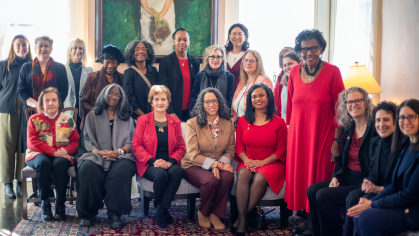Rebecca Reynolds Retires from Douglass after 30-Year Career
For 30 years, Rebecca Reynolds, Assistant Dean of the BOLD Center, has offered the College and its students her outstanding professional excellence. As such, it is bittersweet for the College to share the news of her coming retirement this September.
Perhaps most notably, Reynolds has been a fierce advocate and compassionate mentor for decades of Douglass students. Reynolds said it is these relationships, in which she really connects with students, that she’ll miss the most.
“Without question, working with students has been the highlight of my job at Douglass,” Reynolds said. “At times, I have helped them along their paths, and at others, I have learned from them. Every student is their own universe full of experiences, intelligence, and dreams for the future. It’s been an honor to be a part of so many student journeys at Douglass and Rutgers.”
In addition to her current role as the Assistant Dean of the BOLD Center, Reynolds has held several leadership roles at Douglass and Rutgers since 1991. Her positions include Assistant Director of the Douglass Scholars Program, Assistant Director to the Mabel Smith Douglass Honors Program, and Academic Advising Dean to Seniors, Transfer Students, and Students on Academic Probation. From day one, the community made an impression on Reynolds.
“When I first came to the Douglass honors program in 1991, I was bowled over by the students here,” she said. “They were caring, down-to-earth, passionate about learning, and honest about their feelings—all while often balancing other commitments like jobs or family. I honestly kept thinking, 'wow, I wish I had come here as a college student.'"
Reynolds’s commitment to the welfare of students is the reoccurring thread throughout her 30-year career. In her current role as Assistant Dean of the BOLD Center, she also serves as the Director of the Douglass Mentoring Program. Reynolds establishes the College’s mentoring strategy and leads Douglass staff as they offer guidance to hundreds of Douglass students per year. Her approach to mentoring at Douglass has centered around nurturing a student’s overall well-being. While prioritizing academic excellence, Reynolds has helped set a critical standard for engaging with students beyond their report cards.
“Mentoring allows students to have these ‘big’ conversations—not what courses to take, but what field suits them best, how to handle financial problems, what to do about mental health issues, and where to get help,” said Reynolds. “It also teaches you to listen. I've had students share deeply personal information at times, and I've felt a kind of guardianship. I've thought a lot about being with students during low periods, as well as at their peaks, and how to reassure them and urge them to take the necessary steps. I think that mentoring allows us to be very honest and human around students and that can be rare—especially at a large university. Students need to know they can trust you to care about their whole selves, not just their academic performance.”
The intersection between Reynolds’s strategy for mentoring and her passion for social justice has made her an effective LGBTQIA+ advocate for students at Douglass.
“When I put the LGBTQIA+ advocate sign on my door, or a rainbow flag on my desk, I am signaling to students that I might be a safe person to talk to. It also allows me to be open about being a lesbian and coming out, especially if it is going to be helpful for a student to see someone like them,” Reynolds said. “I think some people can be advocates in name, but not always in action. So for me, being an advocate is a lot like mentoring—caring about the whole person and what their needs are. Over the years, some students have had really big problems—like getting kicked out of their homes. In a couple less serious, but sad cases, I've had students whose parents refused to go to their graduations. I always let the students know that I will be there—I'm not a substitute for their families, but I want them to know that someone has their backs.”
In addition to advising, Reynolds also taught courses at the University for many years. A creative writing and women and gender studies instructor, Reynolds often found ways to make her classes pertinent to the interests of students. Particularly, she has made an impact as an instructor for the Douglass foundation course, Knowledge and Power: Issues in Women’s Leadership.
“When I teach Knowledge and Power, I find that students really are attuned to injustice in the world around them, and by and large, want to speak out against it,” she said. “I will miss that energy and passion as students figure out how to use their voices or their skills to address inequities. I am inspired by them.”
In addition to her work in higher education, Reynolds is also an accomplished poet. She has written two books of poetry, The Bovine Two-Step and Daughter of the Hangnail, which received the First Book Award from the Poetry Society of America, and she was recently nominated for a Pushcart Prize.
“I am retiring in order to write—I have been writing throughout the years, but after my second book, I became a dean and got really busy,” said Reynolds. “In addition to two poetry manuscripts, I'm also working on a hybrid poetry/non-fiction piece. So I actually have my work cut out for me!”
In addition to writing, Reynolds plans on returning to teaching creative writing part-time.
To future Douglass students, Reynolds offers some words of advice:
“I would tell students not to be afraid of their own ambitions, and that it is okay to be a complex person and to make mistakes.”
The College extends its most sincere gratitude to Reynolds for her long tenure of excellence, and wishes her a happy and fulfilling path ahead!
For more on Reynold’s career, please click here.


